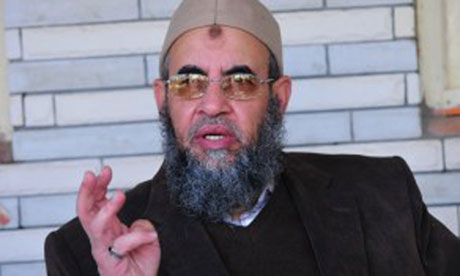When General Abdel Fatah al-Sisi announced Mohamed Morsi's departure on Wednesday night in front of a panel of politicians and religious figures representing a cross-section of Egyptian society, there was one unlikely face behind him. It was the bearded Younes Makhyoun, chairman of Egypt's largest Salafi – or ultra-orthodox – political party, al-Nour.
Nine months ago, al-Nour was a key ally of Morsi's Muslim Brotherhood. Now it is the most unexpected player in the secular-leaning coalition guiding Egypt through its latest transition. In November it was seen as a crucial partner in the Brotherhood's Islamist-slanted constitution. But since January, in a shrewd display of political nous, it has distanced itself from Morsi. This culminated in its decision, alone among Salafi groups, to fence-sit during last Sunday's mass protests that eventually toppled Morsi from power.
By Wednesday, it was actively backing his removal – and by Saturday, it was playing a crucial role in the interim regime that has replaced him. The decision to delay Mohamed ElBaradei's appointment as prime minister was down to al-Nour believing he is too secular for its liking.
"They essentially have veto power over the coalition," said Shadi Hamid, director of research at the Brookings Doha centre and an expert on political Islam. "The new government needs al-Nour, as they need to be able to point to at least one Islamist party on their side. If they lose al-Nour, they will have thousands of al-Nour party supporters joining the Brotherhood in the streets."
Egypt's hard-line Salafi politicians, once mocked as political novices, have emerged as important players in the country's fast-changing political contest.
Over the weekend, representatives from the Nour Party leveraged their position as the only Islamist voice in Egypt's emerging government to block Mohamed ElBaradei's nomination as prime minister, according to people close to the negotiations.
The Nour Party, the largest political bloc representing hard-line Salafi Islamists, hopes to benefit from the growing dissatisfaction with ousted President Mohamed Morsi and the Muslim Brotherhood that backs him.
Nour's veto of Mr. ElBaradei's nomination during the late-night negotiations belies the notion, widely repeated among liberal-leaning protesters for the past few days, that Mr. Morsi's departure had dealt a near-fatal blow to political Islamism in Egypt.
"I think the dynamics of the Nour Party was to fill the vacuum of the Brotherhood," says Khalil Al Anani, an expert on political Islam and a professor at Durham University in the U.K. "They are counting on the military and other forces to give them support after the ashes settle. They think they can make gains in the next parliamentary elections and they might get some government posts." Egypt's new government has yet to determine the timeline for the next parliamentary elections.
after the ashes settle. They think they can make gains in the next parliamentary elections and they might get some government posts." Egypt's new government has yet to determine the timeline for the next parliamentary elections.
The Salafis laid the groundwork for their new prominence at the beginning of the year.
Since Egyptians ousted former President Hosni Mubarak in February 2011, the ultraconservative Islamist Salafis had walked in lockstep with the Muslim Brotherhood, which shares their desire for an Islamist state.
But Nour began to break with the Brotherhood in February, when Mr. Morsi dismissed Khaled Alam Eldin, one of his Salafi presidential advisors, after accusing him of corruption. Mr. Eldin denies the allegations.
Since then, the Nour Party has increasingly aligned itself with a largely secular opposition that shares few of its political goals, except perhaps that of removing Mr. Morsi.
Though they are ideologically similar, Salafis are more conservative than the Brotherhood. Salafis practice an austere doctrine that seeks to emulate not only the values, but also the dress and deeds of the Prophet Muhammad and his contemporaries. Salafis are known for wearing long beards and religious cloaks.
Their focus on imposing Islamic law made them a favorite among highly conservative voters in rural areas, many of whom are dissatisfied with the Brotherhood but still unlikely to cast ballots for secularists.
Read more: http://www.nasdaq.com/article/salafist-party-becomes-an-unlikely-decider-in-egypt-20130707-00023#ixzz2YQTbhG25
Read more: http://www.nasdaq.com/article/salafist-party-becomes-an-unlikely-decider-in-egypt-20130707-00023#ixzz2YQTbhG25







0 comments:
Post a Comment